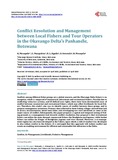Conflict resolution and management between local fishers and tour operators in the Okavango Delta's panhandle, Botswana

View/
Date
2015-04-22Author
Mosepele, K.
Mmopelwa, G.
Kgathi, D.L.
Setswalo, A.
Mosepele, B.
Publisher
Scientific Research Publishing, http://www.scirp.org/Rights
This work is licensed under the Creative Commons Attribution International License (CC BY).Rights holder
The authors and Scientific Research Publishing Inc.Type
Published ArticleMetadata
Show full item recordAbstract
Conflicts among different fisher groups are a global concern, and the Okavango Delta fishery is no
exception, which is composed of commercial, subsistence and recreational fishers. Possibly due to
conflicting value/use systems, and ill-defined user rights, there have been documented cases of
conflict between commercial and recreational fishers, which may affect livelihoods for local fishers.
Therefore, this study’s aim was to identify causes of conflict between these groups and to
propose management inventions. Primary data collected in three fishing villages showed that lack
of access, misconceptions about each other, and overlapping use were identified as some of the
major causes of conflict. Subsequently, this paper proposes a spatial and temporal zoning of fishing
grounds as a management tool towards conflict resolution. One proposal is that recreational
fishers can utilize the main channel, commercial fishers the floodplains and lagoons, while basket
fishers can utilize the fringes of floodplains, lagoons and river channel. Moreover, a co-management
regime has also been developed in the fishery, upon which a code of conduct was developed
to also reduce conflict in the fishery. It is envisaged that this approach will reduce conflict and
create an enabling environment for efficient and sustainable fish utilization in the Delta.
Collections
- Research articles (ORI) [270]
